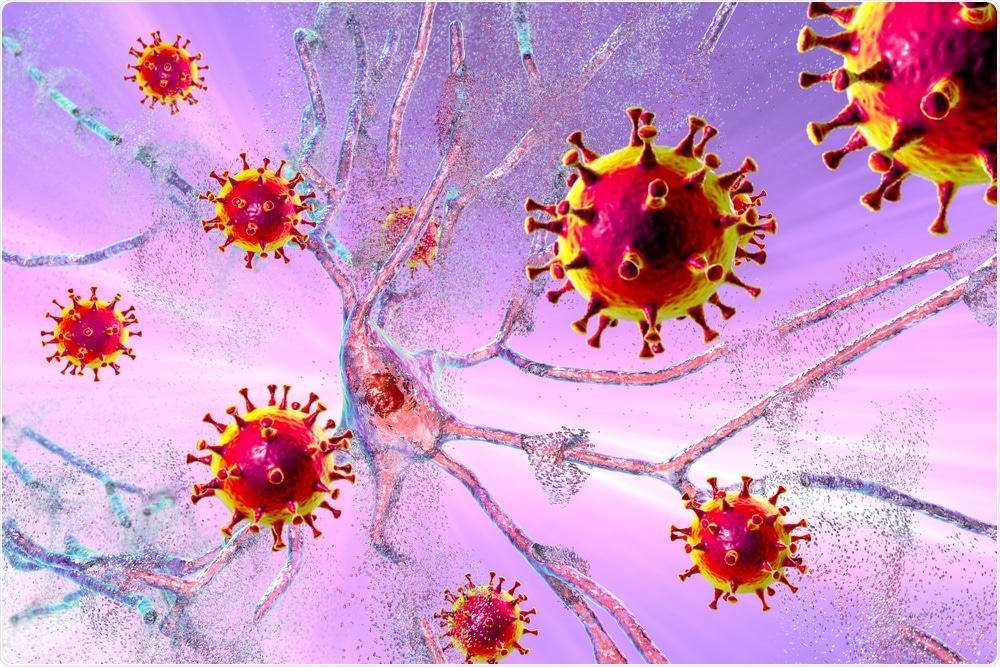There have been many studies since the beginning of the coronavirus disease 2019 (COVID-19) pandemic that have highlighted the issue of long COVID.
The term long COVID is used to describe a patient who is exhibiting several disease-specific, non-specific, and neuropsychiatric symptoms for an extended period following acute COVID-19. Long COVID can also be accompanied by a failure to return to pre-infection functional levels.
 Study: Long COVID: Assessment of Neuropsychiatric Symptoms in Children and Adolescents – A Clinical Data Analysis. Image Credit: Kateryna Kon / Shutterstock.com
Study: Long COVID: Assessment of Neuropsychiatric Symptoms in Children and Adolescents – A Clinical Data Analysis. Image Credit: Kateryna Kon / Shutterstock.com

 *Important notice: medRxiv publishes preliminary scientific reports that are not peer-reviewed and, therefore, should not be regarded as conclusive, guide clinical practice/health-related behavior, or treated as established information.
*Important notice: medRxiv publishes preliminary scientific reports that are not peer-reviewed and, therefore, should not be regarded as conclusive, guide clinical practice/health-related behavior, or treated as established information.
An overview of long COVID
Long COVID is particularly common in adult patients following acute infection with the severe acute respiratory syndrome coronavirus 2 (SARS-CoV-2), which is the virus responsible for COVID-19. In terms of the neurological symptoms of long COVID, cognitive impairment, post-exertional malaise, and muscle pain are the most frequent complaints. In fact, one recent paper on adult COVID-19 patients found that 75.1% exhibited neuropsychiatric symptoms such as hallucinations, altered mental state, and photophobia, after infection.
In children, COVID-19 infections often result in milder symptoms; therefore, it is often rare that serious complications arise resulting in severe illness or death. The less pronounced symptoms in children is likely due to a stronger innate immune response from the immune cells in their airways. However, there have been increasing reports of long COVID in both children and adolescents.
Study aims and methodology
In a recent study published on the preprint server medRxiv*, the researchers assessed a cohort of child and adolescent patients from the field of psychiatry to determine the presence of any neuropsychological symptoms after recovering from COVID-19.
The first stage of this study was focused on selecting the correct patients to be involved. The main selection criteria were that the participants were previously treated in a child and adolescent clinical psychiatric setting between January 1, 2021, and September 2, 2021. Additionally, all participants were required to have laboratory confirmation of COVID-19. The study was conducted in the format of a questionnaire, which was emailed to the parents of selected patients.
A clinical psychiatrist delivered the questionnaire via a 20-minute telephone interview. There are no standardized questionnaires available regarding long COVID in children or adolescents. Therefore, the researchers formulated their own survey with questions based on the most commonly reported neuropsychiatric and long COVID symptoms.
If the questionnaire highlighted definitive evidence for long COVID, a clinical psychiatric examination was performed, consisting of cognitive flexibility, divided attention, phasic alertness, and test battery for Test for Attentional Performance (TAP) with the sub-tests Go/NoGo. Additionally, patients received blood tests to measure their antibody titer values against SARS-CoV-2 and underwent an electroencephalogram (EEG).
Study findings
A total of 380 patients provided feedback in the current study, of which three had been diagnosed with COVID-19, but only one displayed signs of long COVID. The patient described his symptoms during acute infection as suffering from ageusia, fever, and cough. Prior to infection, the patient had no psychiatric comorbidities, no somatic diseases, displayed stable psychosocial health, and was well-controlled on medication.
Following infection, the patient reported worsening of mood swings, needing more sleep, speech abnormalities, confusion, increased anxiety, depression, problems with concentration, delusion of persecution, aggressiveness, headaches, and daytime fatigue. The results from the neuropsychological examination showed the patient to be relatively sound of mind, with the TAP test producing normal values. Whereas the EEG only displayed age-specific changes, the COVID-19 serological test was negative and all the blood test values were normal.
Implications
This research demonstrates interesting results, as the patient complained of various symptoms following infection but displayed normal values for all tests. Due to the complexity of mental illness, especially its capability to manifest both mentally and physically, it cannot be determined with certainty that the issues he complained of were because of long COVID.
Neuropsychiatric symptoms of long COVID in children and adolescents appear to be rare, which explains why this sample size is so small. With the sample size being so small, it is not possible to extrapolate the results to represent the population as a whole.
This study highlights the need to acquire more specific details regarding the symptoms of long COVID, which could be utilized to produce standardized questionnaires explicitly for use in child and adolescent clinical psychiatric settings. Formulating and implementing child/adolescent-specific questionnaires may result in the identification of patients who otherwise would have been missed.
Due to the novelty of COVID-19, it is impossible to know what the future of the pandemic may hold. Therefore, while the occurrence of neuropsychiatric symptoms of long COVID in children and adolescents may be rare today, this could change in the future.

 *Important notice: medRxiv publishes preliminary scientific reports that are not peer-reviewed and, therefore, should not be regarded as conclusive, guide clinical practice/health-related behavior, or treated as established information.
*Important notice: medRxiv publishes preliminary scientific reports that are not peer-reviewed and, therefore, should not be regarded as conclusive, guide clinical practice/health-related behavior, or treated as established information.
Source:
- Mirfazeli FS, Sarabi-Jamab A, Jahanbakhshi A, Kordi A, Javadnia P, Shariat SV, et al. (2020). Neuropsychiatric manifestations of COVID-19 can be clustered in three distinct symptom categories. Sci Rep. DOI: doi: 10.1038/s41598-020-78050-6
Journal reference: